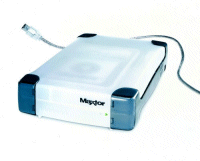|

Inside
the magazine
Self-help message board
Article reprints
How to contact us
Web links directory
Software downloads
Tips and advice
Fire-wire campaign
Subscribe today
Help Me, I'm new!
Fair pricing petition
Home

In
Software Downloads:
Adobe
Premiere 6 (trial)
Paint Shop Pro 7 (trial)
Tips
and Advice:
How to get started with
computer video editing
Fire-wire
Campaign:
Join our ongoing campaign
|
Trio
of external FireWire drives
The FireWire revolution
has brought with it many enhancements to computer based video editing.
DV-equipped camcorders are hot property, being much easier to connect
to a computer than their predecessors, which carried only analogue outputs
and required expensive video capture cards and very deep pockets. In
theory, connecting a DV camcorder to a FireWire-savvy computer makes
you a potential movie-maker.
But DV footage consumes disk space at a goodly rate - 3.6MByte/sec
(over 2GByte for 10 minutes of footage) - and so requires large-capacity
hard disk drives. This is a particular problem for editors basing their
studio around laptop PCs - Mac or Windows - or indeed desktop computers
with no further room for additional hard disk drives, such as Apple
iMacs. It's not simple to substitute a larger-capacity drive in portables
(or iMacs), so many video editors want to know whether external drives
can be used to increase capacity.
 When
they look into it they soon realise that, although external USB drives
are cheaper than their FireWire counterparts, their dismally slow transfer
rates (1.5MByte/sec or worse) mean such drives are little use to the
video editor. In contrast, FireWire hard drives - using an interface
with a theoretical maximum transfer rate of 50MBytes/sec - initially
seem an excellent match for space-starved video editors, whose DV demands
are well within this theoretical figure. But FireWire drives are not
without their own problems - as we've found in previous tests. It's
also important to know that no one has yet made an affordable FireWire
hard drive that performs anything like as quickly as the theoretical
FireWire maximum. Indeed, data rates of 5MByte/sec are not uncommon,
and that's a much slower performance than when the same IDE drives,
as used in FireWire cases, are fitted inside a Mac or Windows PC and
connected directly to the motherboard. When
they look into it they soon realise that, although external USB drives
are cheaper than their FireWire counterparts, their dismally slow transfer
rates (1.5MByte/sec or worse) mean such drives are little use to the
video editor. In contrast, FireWire hard drives - using an interface
with a theoretical maximum transfer rate of 50MBytes/sec - initially
seem an excellent match for space-starved video editors, whose DV demands
are well within this theoretical figure. But FireWire drives are not
without their own problems - as we've found in previous tests. It's
also important to know that no one has yet made an affordable FireWire
hard drive that performs anything like as quickly as the theoretical
FireWire maximum. Indeed, data rates of 5MByte/sec are not uncommon,
and that's a much slower performance than when the same IDE drives,
as used in FireWire cases, are fitted inside a Mac or Windows PC and
connected directly to the motherboard.
The bottleneck must lie in the bridge between the external IDE drive
and the PC's FireWire interface, but we're still trying to find out
why it exists, and whether makers are able to resolve it.
What is particularly galling is that most FireWire drive makers still
continue quoting the 50MBytes/sec (or the even more impressive-sounding
400Mbit/sec) data rate on their packaging and on promotional literature,
including that on web sites.
Whether or not you consider going the FireWire route for video editing
depends on your system and specific requirements. If there is room inside
your PC to add internal EIDE drives, and you have no need for a removable
solution, then EIDE is a cheaper option than FireWire, and one that
is pretty much guaranteed to deliver the data-rates required for editing.
If, however, you are using any sort of computer where internal drive
expansion is not possible or is impractical, or need to run a drive
on more than one computer, then FireWire starts to make sense - especially
if the machine has FireWire socketry built in.
Users of Apple iMacs or iBooks who need extra drive space and don't
fancy doing a hard-disk transplant will consider FireWire the only practical
alternative. And, users of Apple PowerBooks or other fully-spec'd laptops
with built-in FireWire may decide that FireWire represents an easier
option than a CardBus SCSI adaptor with an external SCSI drive.
Though we've only looked at three FireWire drives here, we think it's
been a reasonably representative sample for video editing purposes.
The giant-capacity Maxtor is clearly the best of this bunch, in practical
terms, and also in terms of value for money. The Western Digital lags
some way behind, and the LaCie is completely out of contention for Windows
editing systems, and for Mac use without FWB's Hard Disk ToolKit or
OS 9.1.
More in the April
2001 issue of Computer Video Magazine
|
Recent features...
View
The Archive
Reviewed in April's
issue:
External FireWire drives
Dazzle Hollywood DV-Bridge
JVC GR DV-2000
In April's news:
Adobe After Effects 5
Panasonic Pro Mini DV
EZDV Grows Up
|





 When
they look into it they soon realise that, although external USB drives
are cheaper than their FireWire counterparts, their dismally slow transfer
rates (1.5MByte/sec or worse) mean such drives are little use to the
video editor. In contrast, FireWire hard drives - using an interface
with a theoretical maximum transfer rate of 50MBytes/sec - initially
seem an excellent match for space-starved video editors, whose DV demands
are well within this theoretical figure. But FireWire drives are not
without their own problems - as we've found in previous tests. It's
also important to know that no one has yet made an affordable FireWire
hard drive that performs anything like as quickly as the theoretical
FireWire maximum. Indeed, data rates of 5MByte/sec are not uncommon,
and that's a much slower performance than when the same IDE drives,
as used in FireWire cases, are fitted inside a Mac or Windows PC and
connected directly to the motherboard.
When
they look into it they soon realise that, although external USB drives
are cheaper than their FireWire counterparts, their dismally slow transfer
rates (1.5MByte/sec or worse) mean such drives are little use to the
video editor. In contrast, FireWire hard drives - using an interface
with a theoretical maximum transfer rate of 50MBytes/sec - initially
seem an excellent match for space-starved video editors, whose DV demands
are well within this theoretical figure. But FireWire drives are not
without their own problems - as we've found in previous tests. It's
also important to know that no one has yet made an affordable FireWire
hard drive that performs anything like as quickly as the theoretical
FireWire maximum. Indeed, data rates of 5MByte/sec are not uncommon,
and that's a much slower performance than when the same IDE drives,
as used in FireWire cases, are fitted inside a Mac or Windows PC and
connected directly to the motherboard.